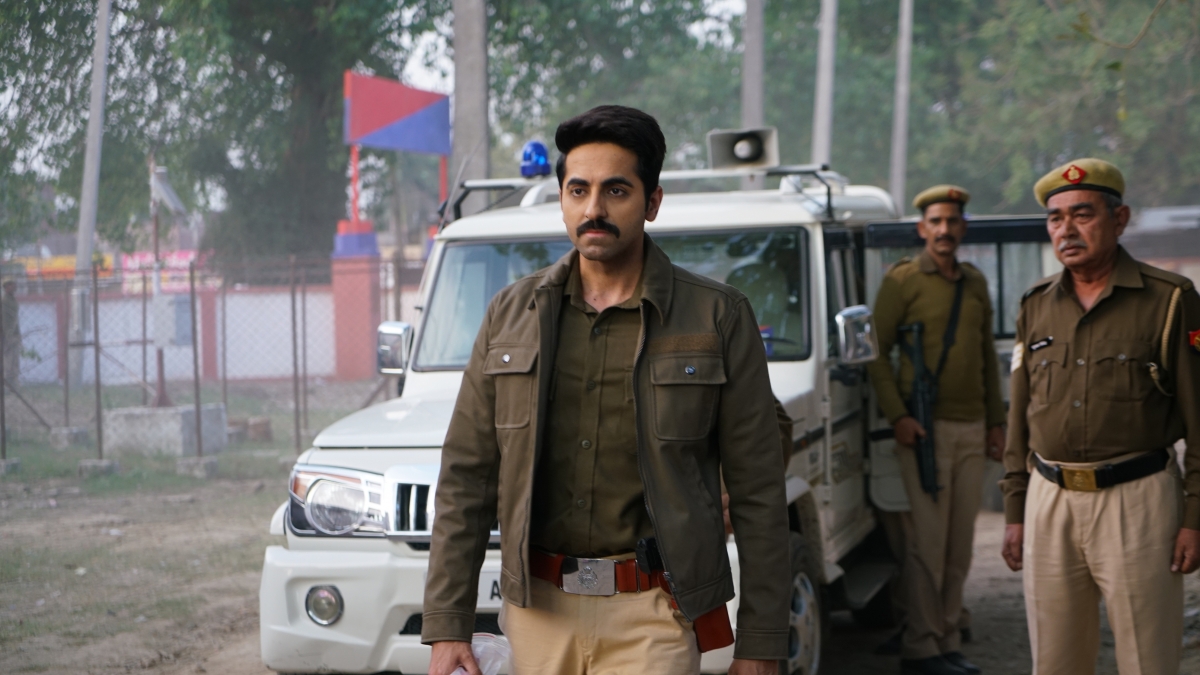It was with Mulk last year that Anubhav Sinha finally came into his own as an extremely relevant filmmaker of our times thereby firmly putting his earlier work like Ra. One and Crash behind him. With Article 15, he proves that Mulk was no flash in the pan. With the film, Sinha not only continues to display a fine command over his cinematic craft but he also shows deep sensitivity in this procedural drama centred around caste distinctions and discriminations in the state of Uttar Pradesh in North India.
Article 15 sees Ayan Ranjan (Ayushmann Khurrana), a Europe-returned Stephenian and an IPS officer posted in Lalbagh, a mofussil region in the badlands of Uttar Pradesh. Ayan is totally alien to the world and oblivious of caste differences and the role that caste plays in day to day life, be it professional or personal. A high caste brahmin, who is not aware of his caste, he is shocked to know that caste discrimination functions uncaringly above the basic tenets of the Indian Constitution, in particular, Article 15, which talks about prohibition of discrimination on grounds of religion, race, caste, sex or place of birth. He is flabbergasted when his driver tells him that a Passi (a Dalit sub-caste) will not serve him water! Ayan shares his new found experiences with his estranged wife, Aditi (Isha Talwar), a gender and human rights activist in Delhi, who has become rather disillusioned with Ayan. In Lalbagh, Ayan is confronted with the disappearance of three teenage Dalit girls. The enquiry into the case brings Ayan face to face with the caste dynamics of Lalbagh. He finds that even the police force there is divided on caste lines and that it is caste hierarchy that determines power and collusion with the political class. Ayan finds himself hopelessly inept to begin with but as the investigation progresses and the culprits are brought to book, he too finally comes of age.
Sinha bases his film around true life incidents that have occurred like the horrific suicide of Badaun sisters, the ghastly Una floggings and the rise of Yogi Adityanath. To his credit, he blends and connects all of these strands into the main storyline with a fair amount of success to make quite a coherent narrative whole, though it has to be said that there are times where the ellipses are unsettling. Where the film scores majorly is in the way Sinha has conceived and written the character of his protagonist, Ayan Ranjan, most convincingly played by Ayushmann Khurrana. A huge (and welcome) departure from the typical Bollywood cop, Ayushmann’s Ayan Ranjan is no Bajirao Singham or others of his ilk. He is believably real, flawed, low on self-esteem thanks to his wife’s estrangement from him and to top it all, he is a non-violent, non-abusive cop. The very introduction of Ayan is with the famous Bob Dylan song, “How many roads must a man walk down before we call him a man…”, which not only sets up his character and his crisis but also tells us just how disconnected he will be in the world he is entering. The search for the rapists and killers by Ayan is also layered with his own search within and here the director-actor, both, come out with flying colors.
Of the supporting cast, both Manoj Pahwa as the upper caste criminalized cop, Brahmadatt, and Kumud Mishra as Jatav, the lower caste cop, are stellar. In fact, some of the best scenes of the film belong to these two as we see just how deeply caste-ridden and prejudiced the police is! We realise tragically just how redundant Article 15 is in today’s times and that is where Sinha manages to hit both the audience and his protagonist hard in the solar plexus. As Brahmadatt tells Ayan, “While you may get away with a transfer, we would get killed.” On the flip side, Sayani Gupta as Gaura, the firebrand Dalit girl and the girl friend of Dalit leader Nishad (nicely played by Mohammad Zeeshan Ayub) seems out of place. She is a good talent, no doubt, but she really needs to get over her ‘uber cool web series hangover’ if she wants to effectively carry off such roles. It is always a pleasure to watch Nasser on screen and he is expectedly spot on as the CBI officer.
Technically, Ewan Mulligan’s cinematography is aptly atmospheric. The hazy mornings and nights that Mulligan has created add to the mood, the milieu and the theme of the film. After all, isn’t it all fuzzy out there where nothing is as clear s it seems?
All in all, films like Mulk and Article 15 are extremely relevant films and desperately the need of the hour in the country today. One wishes Anubhav Sinha continues with his growth as a filmmaker of importance with his upcoming films too.
Hindi, Drama, Color



Excellent review. One critic remarked that Sinha and upped the Brahmin agenda by making the IPS officer a high-caste Brahmin who tries to bring justice to the wronged Dalits. But I do not agree. What matters is humanity and justice so whether a Brahmin manages it or whether the Dalit comes forward to save his kin is not important at all.